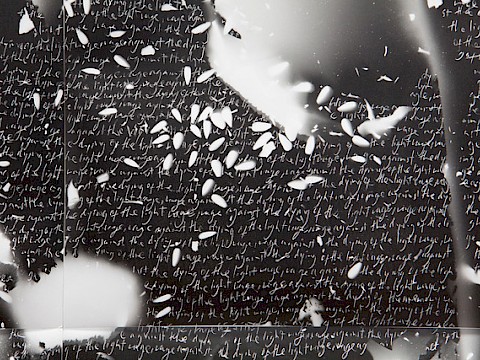20 April 2020
These Extraordinary Times with William Mackrell
Q & A
Detail: Rage rage against the dying of the light, 2019. Image: Courtesy he Artist.

LP: How has your daily routine changed?
WM: The routine hasn’t changed too much… I’m still making the short walk from my flat to the studio, which is in the nearby park. The walk is now both my exercise and as ever it is this journey where thoughts get processed, setting me up to begin the day.
Within the routine its true that the initial panic of getting to family stuck alone, ordering medicines and food deliveries was a huge worry, but now help is in place and on-going the panic has subdued a bit. My art things in the coming year that have gone onto hold including a solo project planned at the Musée DeIacroix in June feel minor concerns that will emerge out of the strangeness of these days.
LP: Many artists work in solitude ordinarily. How has isolation or social distancing affected you in these times?
WM: It’s true for me in this sense, but isolation is a malleable feeling and definitely plays out differently during this huge expanse of weirdness we are facing. I’ve returned recently to a work titled, Rage, rage against the dying of the light that coincidently began last Autumn on residency with LaunchPad. This particular piece has come to hold a certain place of magic because of its celestial imagery of exploding sunflower seeds interwoven with mantra like text. I’m finding solace here seeing the work grow each day, consuming subliminal messages that break the repetition. It’s turning into a sort of self-therapy work of its time!
LP: If there is any silver lining, what is it?
WM: It’s a time none of us can forget, even if there is a desire for things to get back to normal. The virus has intertwined tragedy with compassion, anxiety of loneliness but a total togetherness. I think there is such a chance here to overhaul how we operate our lives: to readdress failings in social, environmental and economic behaviours. But that has to include confronting the whole living system – seeing fish return to the canals of Venice for the first time in fifty years or the air pollution across cities dropping to record levels give us this visual hope from which to start afresh.
LP: Make up your own question and answer it.
WM: Has culture become more important now than ever?
There has been a lot said of how when there is a global crisis, the art flourishes. The Weimar republic saw this in the 1930’s and I was talking with my Dad who always compares a feeling of the 30’s to now with the returning age of dictatorship politics. Here in the UK music, performance and to a smaller extent art exhibitions (I would say) has responded to a feeling of urgency. The combination of the Coronavirus pandemic blowing a hole through political bleakness will see an entirely new shift in how we ignite our culture.